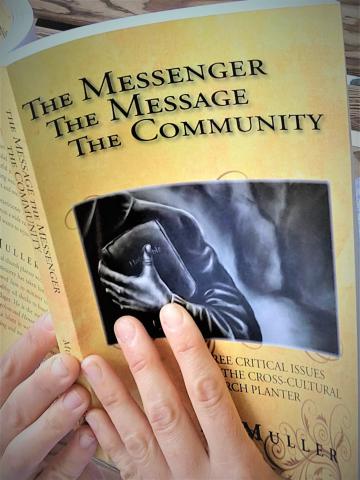Book Review of The Messenger, the Message, the Community, by Roland Muller
Part 1 of 3, THE MESSENGER
Arriving as a young missionary in the Middle East in the 1970’s, Roland Muller was wondering, “How do I go about this?” No one among the missionary church planters seemed to have an answer. Around 15 years later, Muller’s search began in earnest when he was asked to begin an apprenticeship program for a large group of new missionaries.
The object of Muller’s search? Successful church-planters. Muller sought evangelists who met all of the following criteria:
1. They had a number of successes, not just one or two converts here and there.
2. They had experience integrating new converts into church fellowships.
3. They demonstrated long-term results, rather than quick conversions that didn’t last.
From the few men and women on the resulting list, Muller learned many principles that any of us can incorporate in our evangelism efforts. Though the book is written for the cross-cultural worker, these principles can encourage and guide anyone who wants to share the Gospel effectively with others.
Following are a few brief points from Part 1, “The Messenger.”
Gain an acceptance. You need to build credibility with the people if you are to be an effective messenger to them. Especially in cross-cultural settings, you begin as a newcomer and an outsider. Muller expands on several points:
-Know who you are and your role in society.
-Build bridges into the lives of others.
-Work at becoming an insider.
-Allow others to see godliness in your life.
Muller stresses that language learning and cultural adaptation are not enough. You must build credibility.
Prepare appropriate tools. While the Holy Spirit’s work is paramount, and prayer is our first priority, our work can be more effective if we know how to apply the right tools. These may include prepared lessons, or lists of questions. From successful evangelists and church planters, Muller has gathered various tools at his website, rmuller.com.
Become a person they will seek out. Muller tells how after just a few minutes of conversation with Harry Young, a group of young men showed up the next day asking for Mr. Young to teach them the Bible. Muller himself had known these young men for over a year, and seldom had conversations with them about spiritual things. What was it about Harry and other successful evangelists?
“It’s the Cross,” one of them told him. These men and women had all know what it is to experience death to self. Many of them went through severe crises as part of their learning to yield to God.
Muller recognized that, in addition, these people saturated themselves with the Word of God. They loved it, read it, studied it, and knew it. This too was part of their secret.
Know your agenda. These successful evangelists didn’t do friendship evangelism, and neither were they confrontational in their approach. They consistently used an approach Muller refers to as “teacher-based evangelism.” By knowing their agenda and consistently promoting truth, bit by bit, following up one nugget with another, they were recognized as more than just a friend, but a teacher. In this way, they avoided being drawn into discussing the other person’s agenda—which was usually to convince them of the legitimacy of Islam.
Muller presents a continuum of approaches to evangelism and suggests that the middle is optimum:
Lifestyle — Friendship — Teacher-based — Proclamation — Confrontation
Gauge their interest. “Whenever these evangelists met someone, they began to assess his or her spiritual development, and target their ministry accordingly. Their aim was. . .to move him or her along from one stage to the next.” They would not invest large amounts of time and energy in someone who was not interested. But once a person began to show some interest, they were willing to invest more. Their goal was to move such a person onward toward conversion and discipleship.
Salt your conversation. Like Jesus, these evangelists used any conversation as an opportunity to teach truth and generate interest in it. Muller makes two important suggestions:
-Learn to insert proverbs and wise sayings into your conversation, to illustrate truth in a gentle way.
-Learn to use parables that point to a truth without actually stating it, and leave the listener(s) pondering the meaning.
Wherever we are, you and I are called to be messengers of the Gospel. Each one of us can grow in effectiveness. For myself, I have found this first section of the book helpful toward that end.

